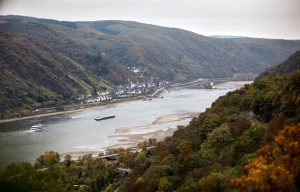The Rhine river might be Europe’s most famous river. Running from the Swiss Alps in the south along the modern Franco-German border to the sea in the Netherlands, it has been a part of major historical events. During the height of the Roman Empire, it signified the boundary between Roman Civilization and the barbaric Germans. During the Medieval and early modern periods, the banks of the Rhine was host to towering castles and came to represent the natural border between France and Germany. During World War Two, the Rhine was a battleground between Nazi and the Allies. Today, however, the river is a peaceful center of trade and tourism that is suffering under a new threat: climate change.
 Low water on the Rhine strangles trade and economic activity Source: https://www.nytimes.com/2018/11/04/world/europe/rhine-drought-water-level.html?module=inline
Low water on the Rhine strangles trade and economic activity Source: https://www.nytimes.com/2018/11/04/world/europe/rhine-drought-water-level.html?module=inline
Last summer was Western Europe’s hottest since record-keeping began in 1767 and has been particularly dry. This weather has stifled trade and tourism on Western Europe’s most important river. Water levels have been reduced to the point where even small ferries have had to stop using the river. This has stifled the tourism industry directly. Trips have been canceled forcing companies to provide refunds, people have shortened their trips, and selected alternative destinations. Furthermore, according to the New York Times, 80% of German shipping uses the Rhine. German gas stations have run out of fuel, industries have had to delay production as they can no longer use the Rhine to cool their plants, and whole projects have been canceled due to the impossibility of shipping the necessary heavy materials. This hot and dry weather has had negative consequences for the economy and threatens to persist as climate change continues to worsen.
Dry hot weather will become more frequent unless climate change is stopped in its tracks. The costs of mitigating and adapting to these challenges are massive. Baring a global solution to climate change, the river could become impassable. Dredging significant portions of the river could become necessary. However, such a program would take years and cost millions while trade stalls. While people may still come to see the areas beautiful castles, tourist agencies will no longer be able to rely on the river as an attraction and form of transportation. Similarly, industries may be forced to relocate in order to survive. Climate change is undoubtedly changing the character of the Rhine. It will no longer be the same attractive place for tourists and industry alike. This suggests that adaptation may simply not be possible. It may soon be too expensive to save the Rhine. Losing access to the history and beauty of the Rhine would be a grave loss for Germany and all of humanity. As the case of the Rhine demonstrates, the costs of climate change are substantial and we are only just beginning to understand how far-reaching these costs are.
SOURCES:
1. https://www.nytimes.com/2018/11/28/travel/european-river-cruises-low-water-cancel.html
2.https://www.nytimes.com/2018/11/04/world/europe/rhine-drought-water-level.html?module=inline
3 .https://www.nytimes.com/2018/08/04/world/europe/europe-heat-wave.html?action=click&module=RelatedCoverage&pgtype=Article®ion=Footer

Ben, your thoughts on this matter are especially interesting and thought-provoking. I have to admit that despite its tremendous historical significance, I have never heard of the Rhine river until I read your piece. It is clear that this is a grave situation that must be effectively dealt with. However, as you shrewdly point out, there does not seem to be any cost and time friendly solutions to the problems that have arisen with the deterioration of the Rhine. The loss of the Rhine will not only hold immense economic consequences but will also result in the loss of history and culture. My blog post touched on a similar topic and I expressed much of the same sentiment in my piece.
Furthermore, your thoughts shed a light on a feature of present day society that must change if we wish to effectively combat climate change. This characteristic is the fact that we, for the most part, do not take action against climate change until it is far too late. In this scenario, it seems that something should have been done at a point in time that would have somewhat alleviated the damages that the deterioration of the Rhine has presented. I think it would have been prudent for Germany to have found ways to limit the economic consequences that they would have inevitably encountered. Instead, Germany must now attempt to come up with a way to save the Rhine while experiencing the enormity of consequences. With that being said, and as you mention, they may have simply run out of time to do so. Thank you for highlighting this important issue and I look forward to seeing how Germany will tackle this problem.